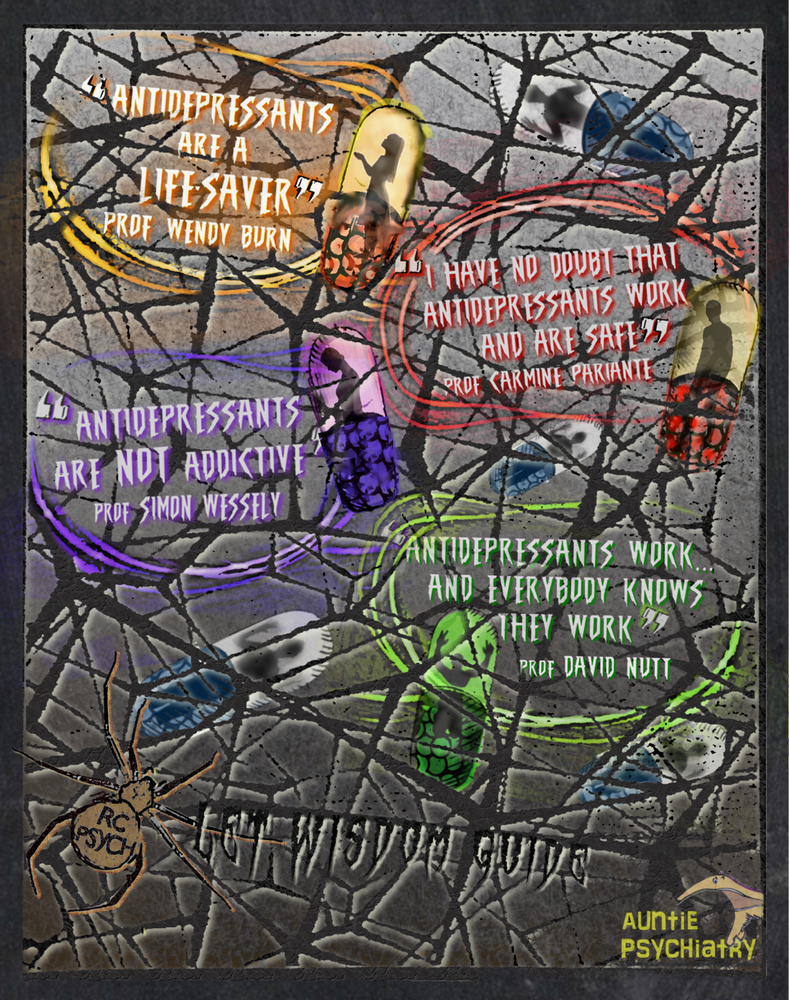
The heat is on for the Royal College of Psychiatrists. For years now, senior members of the profession have made very public pronouncements that “antidepressants” are safe, non-addictive and life-saving. The mainstream media has given them an easy ride – they are, after all, leaders in their field, trusted for their expert knowledge and integrity. But for how much longer?
As the public mood on antidepressants begins to sour, the Royal College of Psychiatrists will quietly disassociate itself from this stance. It is already happening.
In January 2015, RCPsych uploaded this video to Youtube: Coming off antidepressants
This pithy review by ‘perimele6’ captures the overall tone of people’s comments…
“Why doesn’t this weird little video just come out and admit it: antidepressants are physically addictive and stopping causes awful withdrawal? It’s creepy how this video invokes authority to skirt the issue…”
But catch it while you can because official guidance from the College on this matter is disappearing fast. The commentary on the video ends by saying “To find out more about coming off antidepressants, visit the Royal College of Psychiatrists website.”
And there is a helpful link to the RCPsych Health Advice webpage…

“The resource you’re looking for is not available. It may have been moved or deleted.”
How long before the link to this video goes the same way?
Read more from Auntie here.




There seems to be little discussion about antipsychotic withdrawals and isn’t it the case that basically what psychiatry has always done is that it has created its own supply of long term patients.
I do believe that like many millions of people that i am and have always been for the past 45 years a very valuable commodity for both professionals working within psychiatric services within the NHS and the drug industry and of course i do believe at the age of 24 i was indeed wrongly diagnosed.
Saying that there are those professionals within psyciatry who actually do help their patients and these people are little golden nuggets in what amounts to a huge landfill of uncaring professionals and practices.
It still remains that psychiatry creates its own supply of patients and in this crazy world a conveyor belt of broken people is always in long term supply.
Thank you very much Auntie and as usual you have created a very good cartoon!
Auntie..
There’s an imitater on the Horizon.
I saw this on the BBC and thought you should see it:
‘End pill-shaming in mental health’ – http://www.bbc.co.uk/news/health-46268733
What to do when it is pointed out that you are wearing no clothes:
1. Simply say that you are. It’s amazing how gullible people are.
2. Say that no, you aren’t wearing what YOU think are clothes, but in another universe wearing nothing could be seen as fully dressed.
3. Point out that there is a subgroup of people who haven’t said anything yet, so they must think you are wearing clothes.
4. Get some brainy-looking professors to swear blind that your naked form is absolute proof that you are wearing some form of clothes and that they must be working very well. You could even add that “we don’t quite understand the science of how we wear nothing and get away with it, so we must be wearing clothes”. Another nice one is “this look is much more effective than not wearing clothes”.
5. Then its time to go on the attack with “this shaming of those who choose to wear nothing is unnacceptable stigma and its unjustifiable to say that they are not wearing any clothes”.
On a serious note, the one remaining defence of these chemical spanners in the works is that they work on a subgroup of patients for whom it is transformative. Thats what a trial is supposed to isolate, and since there isn’t one and they cannot test for such a group, it is just dreaming. That subgroup may well be those who would otherwise be placebo responders,so there is your clinical study if you want to try it.
@ConcernedCarer – But the procession must go on! (And so it does.) Here’s the extract from the original tale by Hans Christian Andersen…
–‘“But the Emperor has nothing at all on!” said a little child.
“Listen to the voice of innocence!” exclaimed his father; and what the child had said was whispered from one to another.
“But he has nothing at all on!” at last cried out all the people. The Emperor was vexed, for he knew that the people were right; but he thought the procession must go on now! And the lords of the bedchamber took greater pains than ever, to appear holding up a train, although, in reality, there was no train to hold.’–
http://www.online-literature.com/hans_christian_andersen/967/
Yes, a sticky problem of their own making, but they are working hard to extricate themselves. Here’s a Guardian article from two years ago (July 2016): “Why have antidepressant prescriptions doubled in the last decade?”
“He [Prof Simon Wessely] thinks antidepressants are being wrongly demonised and are, if anything, under-prescribed. Far more treatment of mental illness is needed.”
And here’s Sir Simon in a Mail Online article from Monday 5th November 2018…
As Professor Sir Simon Wessely says: ‘We are acutely aware of the dangers of over-medicalisation of what are normal emotional problems… [psychiatrists] are the people who try to maintain some form of boundary between sadness and depression, between eccentricity and autism, between shyness and social phobia”
Here are the links:
https://www.theguardian.com/society/2016/jul/08/why-have-antidepressant-prescriptions-doubled-in-the-last-decade
https://www.dailymail.co.uk/health/article-6355805/The-hidden-depression-injustice.html
Thank You Auntie,
I think it’s a bit of a “sticky” problem for the College.